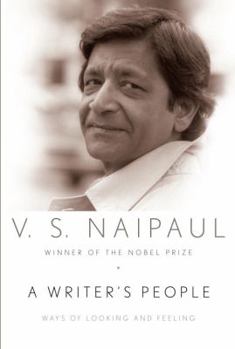A Writer's People: Ways of Looking and Feeling: An Essay in Five Parts
Select Format
Select Condition 
Book Overview
The Nobel Prize-winning author delivers an eloquent, candid, wide-ranging narrative that delves into the sometimes inadvertent process of creative and intellectual assimilation. "Bracing,... This description may be from another edition of this product.
Format:Hardcover
Language:English
ISBN:0375407383
ISBN13:9780375407383
Release Date:April 2008
Publisher:Knopf Publishing Group
Length:189 Pages
Weight:1.00 lbs.
Dimensions:0.8" x 5.8" x 8.6"
Customer Reviews
3 ratings
Everyone's favorite literary scoundrel
Published by Thriftbooks.com User , 15 years ago
Certainly it is no secret that V.S. Naipaul has unsavory aspects to his personality. In this work, "A Writer's People," some of those traits are on display: the snobbishness, the egotism, the general myopia of things, events, moods, which are outside of Naipaul's purview, and therefore, to him, unimportant. But in the cavalcade of harsh judgments, it is easy to the pass over the essential fairness he attempts to exercise in his assessment of other writers. He is critical and dismissive of Walcott, but does not leave out the excitement this poet's work generated both for himself and for other Trinidadians in the 40's. He has nothing particularly good to say about Anthony Powell's work "A Dance to the Music of Time," but he is generous to the man, his easy stance as a writer, and his semi-admiration for his "collection" of people so much like a literary endeavor in its meticulousness. This collection of essays, although a bit disorganized in the flow of ideas, show how strong a writer Naipaul continues to be: witty, incisive, stern, humorous, Naipaul is still a writer of great subtly and dexterity. Here, writing about writing, he still has new things to say.
More than simply a writer
Published by Thriftbooks.com User , 15 years ago
I was not going to write the review but the passion of a fellow reviewer compels me to say a few words. The reviewer had expected humility and dignity from the writer. If the reviwer wishes to see those attributes, why not pick up other books or watch politicians. I thought Mr.Naipaul's most recent book is one of the most amazing book I have ever came across. The book contains a theme: "what is history, what is disaster and what is civilization." This has been the writer Naipaul's preoccupation. He does not write to belittle others or settle some score. Anyone could do it. A reader expects more from a writer of great imagination. He see so much and feel so much. In fact the writer teaches the reader how to be aware of the world around. Reading all his books has been one of my best experience so far.
Exhibits a high culture that is both erudite and realistic
Published by Thriftbooks.com User , 15 years ago
Born in Trinidad of Indian descent and educated in England, V. S. Naipaul won the Nobel Prize for Literature in 2001. In A Writer's People, he is concerned with the process of cultural assimilation--of fitting one civilization to another--and the nature of good writing. "My purpose in this book," he writes, "is not literary criticism or biography. . . . I wish only, and in a personal way, to set out the writing to which I was exposed during my career. I say writing, but I mean more specifically vision, a way of seeing and feeling." Nevertheless, there is much literary criticism and biography in this work. Juxtaposing various authors, Naipaul shows how some are burdened with prejudicial "fixed ideas," and how others have broken free of such constraints to face honestly, with open eyes, our place in a changing world. Naipaul's far-ranging interests include critiques of Derek Walcott, Francis Wyndham, Anthony Powell, Gustave Flaubert, Juulius Caesar, Virgil, Mahatma Gandhi, Jawaharhal Nehru, and many others. The elegant prose and thoughtful content of A Writer's People reveals Naipaul to be a champion of a high culture that is both erudite and realistic, exalted yet down to earth. About the author: V. S. Naipaul was born in 1932 in Trinidad, an island seven miles off the coast of Venezuela. He went to England on a scholarship in 1950. After four years at University College, Oxford, he began to write, and since then has followed no other profession. In 1990 he was knighted by Queen Elizabeth II and in 2001 was awarded the Nobel Prize in Literature. In 1971, Naipaul became the first person of Indian origin to win a Booker Prize for his book In a Free State. In awarding Naipaul the Nobel Prize for Literature in 2001. The Swedish Academy praised his work "for having united perceptive narrative and incorruptible scrutiny in works that compel us to see the presence of suppressed histories." The Committee added, "Naipaul is a modern philosophe carrying on the tradition that started originally with Lettres persanes and Candide. In a vigilant style, which has been deservedly admired, he transforms rage into precision and allows events to speak with their own inherent irony." The Committee also noted Naipaul's affinity with the Polish author of Heart of Darkness, Joseph Conrad: "Naipaul is Conrad's heir as the annalist of the destinies of empires in the moral sense: what they do to human beings. His authority as a narrator is grounded in the memory of what others have forgotten, the history of the vanquished." Naipaul has published more than 25 books of fiction and nonfiction, including Half a Life, A House for Mr. Biswas, A Bend in the River, Magic Seeds and a collection of letters, Between Father and Son.





